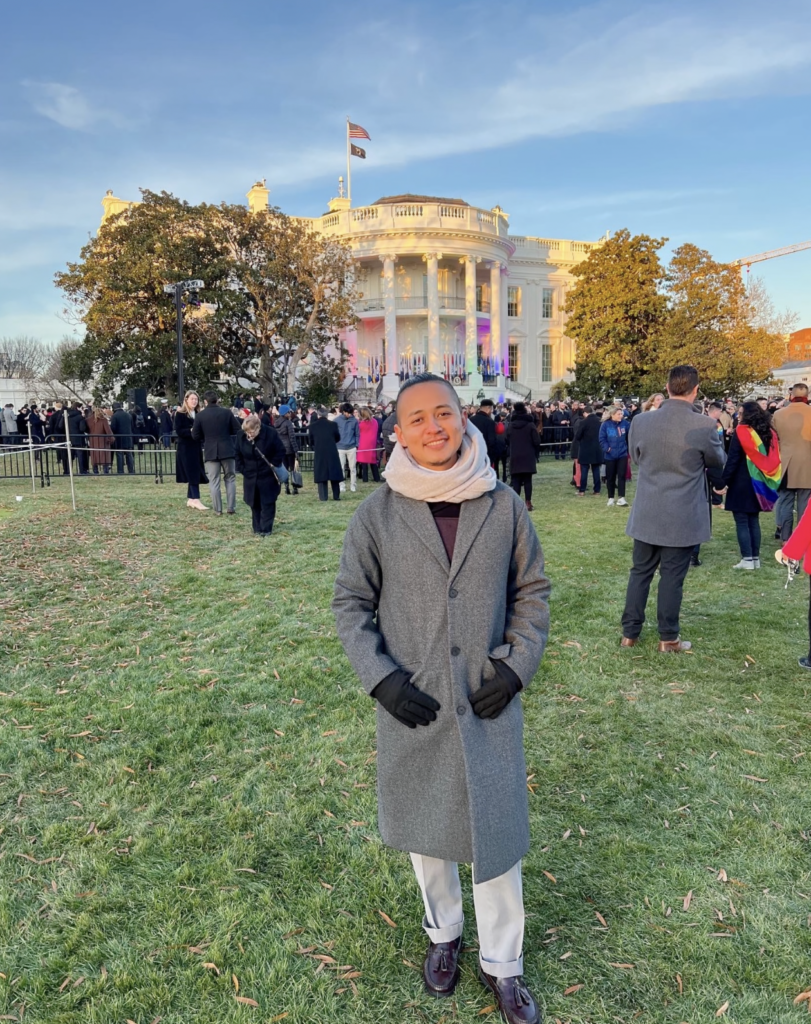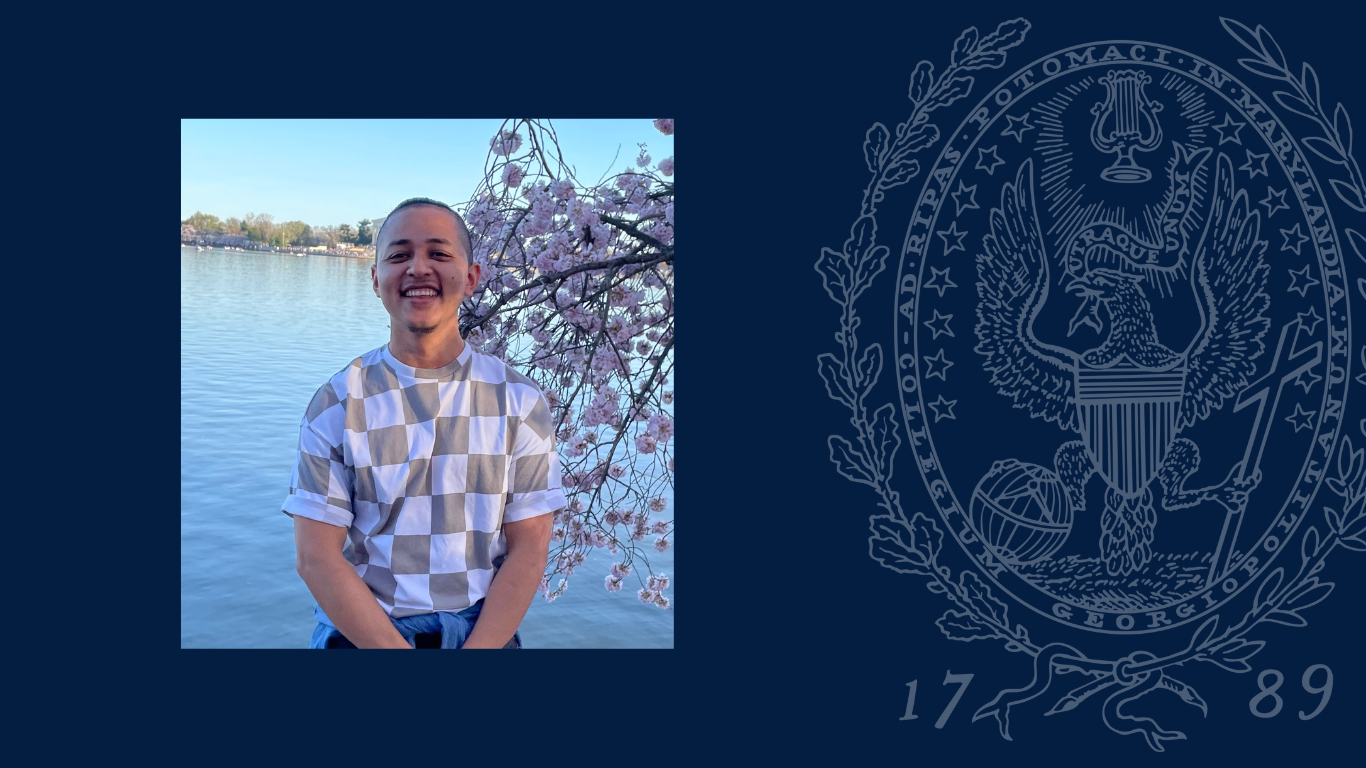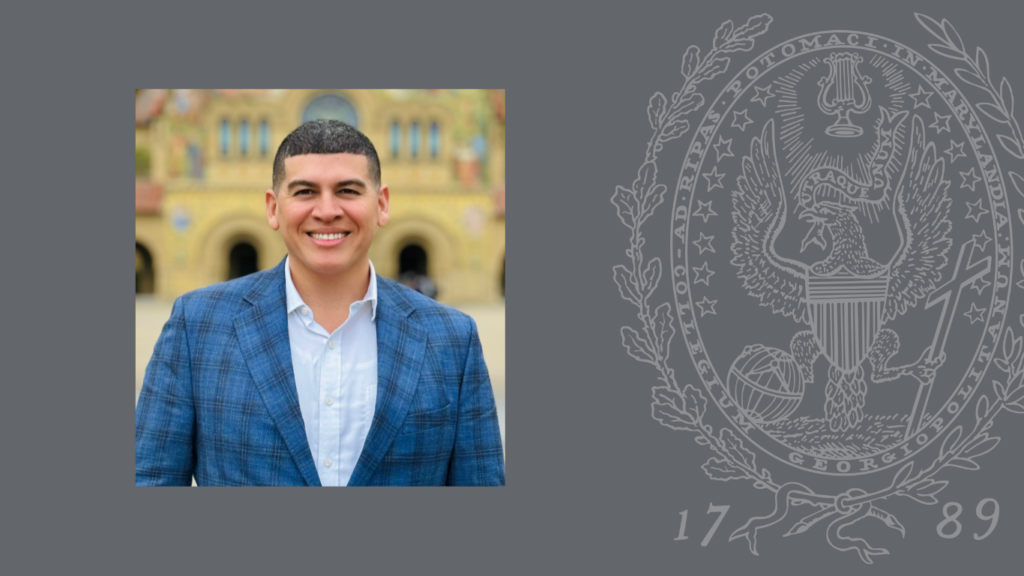Rethinking Research: César Salgado Portillo on Race, Gender & Sexuality in Central America
The Graduate School joins the nation in celebrating and honoring LGBTQ history, culture and achievements during LGBTQ History Month in October. It is also important to recognize the ongoing research efforts related to LGBTQ communities.

César Salgado Portillo outside the White House
We invite you to read the story of César Salgado Portillo (he/him) who is from both Los Angeles, California, and El Salvador. He will earn a Ph.D. in Spanish literary and cultural studies in 2025.
Salgado Portillo shares his take on research as it relates to themes of race, gender and sexuality in Central and North America.
What brought you to Georgetown?
It was a combination of the people, the city of DC and the strong sense of community I felt from the moment I visited. The university’s commitment to academic excellence, social justice and inclusion resonated with me, and I was inspired by the dedication of the students and faculty to create real-world change. Being in Washington, DC, I knew I would have the opportunity to connect with organizations and professionals working at the forefront of global and local issues. The city’s cultural vibrancy and its role as a center for international relations also appealed to me, offering countless opportunities for personal and professional growth, e.g. I had internships at USDA and the Peace Corps.
What led you to pursue a doctorate degree? Do you have a particular research focus? What led you to choose this field?
My decision to pursue a doctorate was driven by my deep commitment to understanding and amplifying the voices of marginalized communities, particularly through the lens of race, gender and sexuality in Central America. My research focuses on how these marginalized groups reconstruct and assert their identities in the face of dominant national narratives, specifically looking at Indigenous, Black, feminine and queer cultural productions in the Northern Triangle countries.
What led me to this field was my realization that academia often silences these voices, especially those from rural and Indigenous communities. I felt a calling to bring those perspectives to the forefront, offering new frameworks, like my theory of los costados (the margins), to understand identity and resistance.
How do you hope your research will contribute to the field of Hispanic and Latina/o/x studies?
I hope that my research will broaden the scope of Hispanic and Latina/o/x studies by challenging dominant narratives and placing marginalized voices – particularly those of Indigenous, Afro-descendant, queer and rural communities – at the center of scholarly discourse. By focusing on cultural productions from historically overlooked regions, such as, what I call “the Afro-Indigenous Pacific,” my work disrupts traditional academic frameworks that often prioritize urban, mestizo perspectives.
Ultimately, I hope my work not only diversifies the field of Hispanic and Latina/o/x studies, but also encourages greater collaboration across disciplines, connecting the study of race, gender and sexuality in Latin America with broader discussions on global indigeneity, decolonization and intersectionality. Additionally, I want my research to serve as a platform for future scholars, particularly those from historically underrepresented backgrounds, to see themselves and their experiences reflected in the academic canon.
How do you use your research in the classroom?
In my teaching, I integrate my research by designing courses like “Intersectional Approaches in Latin America,” within the Spanish Department, which aligns with my dissertation. This course explores race, gender and sexuality in Latin America, focusing on how marginalized groups – such as queer, Indigenous and Black communities – use cultural production to challenge national narratives of mestizaje and heteronormativity.
My syllabus prioritizes women writers, writers of color and migrant voices, encouraging students to critically engage with identity and resistance. For their final projects, students create audiovisual reflections on how underserved communities resist and rebuild in the face of oppression.
What advice would you give to someone interested in your field?
My advice is to follow your passion and let it guide your research, especially when studying historically underserved voices. Embrace interdisciplinary approaches – drawing from fields like gender studies, history and anthropology will deepen your work.
Always challenge the canon by asking whose perspectives are missing, and be committed to ensuring that your work helps make the world a little better than it is.
Lastly, never forget your roots, build a strong support system and stay resilient. Academia can be tough, but your work has the potential to reshape the field, so just keep swimming forward.
Connect with César on LinkedIn.


